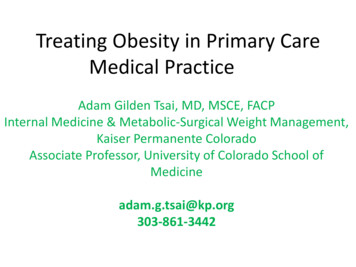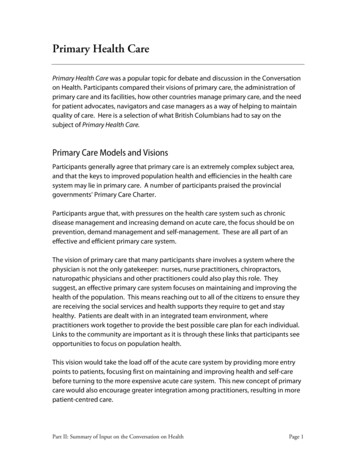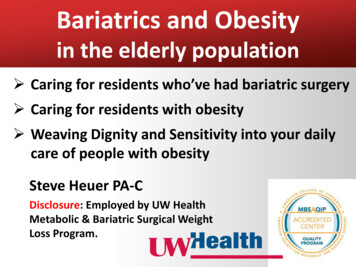
Transcription
Treating Obesity in Primary CareMedical PracticeAdam Gilden Tsai, MD, MSCE, FACPInternal Medicine & Metabolic-Surgical Weight Management,Kaiser Permanente ColoradoAssociate Professor, University of Colorado School ofMedicineadam.g.tsai@kp.org303-861-3442
Disclosures: None
Last Plea PLEASE FILL OUT MY SHORT SURVEY!
Educational Objectives1. Develop evidence-based strategies for counselingpatients about their weight without using drugs orsurgery2. Identify patients who are appropriate for use ofpharmacotherapy to treat obesity and learn appropriatecriteria for long term use of phentermine3. Identify patients who meet criteria for and would benefitfrom bariatric surgery
Financial Disclosure Vindico Medical Education, online book chapter aboutcommercial weight loss programs Nutrisystem: in-kind research support for a clinical trialthat was funded by American Heart Association
Additional Disclosure It is not possible to cover all of obesity evaluation andtreatment in 50 minutes I am happy to provide you with additional readings forareas where you are interested
Educational Objectives1. Develop evidence-based strategies for counselingpatients about their weight without using drugs orsurgery2. Identify patients who are appropriate for use ofpharmacotherapy to treat obesity and learn appropriatecriteria for long term use of phentermine3. Identify patients who meet criteria for and would benefitfrom bariatric surgery
Should PCPs Treat Obesity? (orshould we just outsource it toWeight Watchers) Patients want us to help them with their weight Its good for their health We (and our dietitian and behavioral healthcolleagues) can do more to help a patient thanWeight Watchers can
And if That’s not Enough toConvince You Counseling on weight is a quality metric in some settingsThe AMA declared obesity a disease in 2013Medicare now reimburses for up to 20 visits per yearThe USPSTF recommends high intensity treatment ofobesity and this is covered under the ACA 4 new drugs have been approved since 2012 First ever pharmacotherapy guideline published in 2015 All systems go!!!
Case #1Ms. Smith is a 68 year old patient of yours. You’ve knownher for 5 years. She has hypertension and dyslipidemia andtakes medications for both of these including a statin. Shealso has osteoarthritis of the knees that sometimes requiresTramadol or Hydrocodone. Her body mass index is 29kg/m2. She heard on the radio about “some medical study”which said that if your body mass index was in theoverweight range, that it was the lowest risk for death. Sheis confused because the body weight charts in your officetell her she needs to weigh about 25 lbs less to have a“normal” body weight. What do you tell her?
Case #11.The body charts are correct, she needs to lose 25 pounds25%2. The study she heard about is correct, a BMI in the overweight is best forpatients aged 60 and older3.25%The Studies conflict with each other and it’s best if she see a weightspecialist about this25%4. She is likely to improve her overall function and quality of life the mostwith exercise rather than weight loss25%20
From: Association of All-Cause Mortality With Overweight and Obesity Using Standard Body Mass IndexCategories: A Systematic Review and Meta-analysisJAMA. 2013;309(1):71-82. doi:10.1001/jama.2012.113905Date of download: 10/7/2015Copyright 2015 American MedicalAssociation. All rights reserved.
In Elderly Patients, Exercise Beats Weight LossEffect of Diet, Exercise, or Both on Primary and SecondaryOutcome Variables in Obese Older Adults.RCT of diet, exercise training, or both in patients age 65and BMI 30 kg/m2. Primary Outcome modifiedPhysical Performance Test (PPT):Villareal DT et al. N Engl J Med 2011;364:1218-1229.
Case #1a) The body weight charts are correct, she needs to lose 25poundsb) The study she heard about is correct, a BMI in theoverweight range is the best for patients aged 60 andolderc) The studies conflict with each other and it’s best if shesees a weight specialist about thisd) She is likely to improve her overall function and qualityof life the most with exercise rather than weight loss
Case #2Mr. Jones is a 45 year old man with a BMI of 38 kg/m2. He hassleep apnea and prediabetes by hemoglobin A1c. He hateswearing his APAP mask and often ends up sleeping without it. Heknows he needs to lose weight. He feels like he’s “triedeverything.” When asked specifically, he describes losing andthen re-gaining 25 lbs with the Atkins diet in 2005, and morerecently, following the Paleo diet with his wife but losing only 5lbs. He feels that “I don’t eat a lot – I don’t know how I weigh somuch.” He tries to “eat clean” and “cut out sugar” but his dietrecall shows that he consumed 2 sugar-sweetened beverages inthe last 24 hours and 0 servings of vegetables.What do you recommend to him?
Case #21.The sleep apnea will get better after he loses weight so don’t worry aboutthe APAP mask2.25%He just needs to try harder on diet on his own and cut out sugary drinks,he’ll lose weight3.25%The most effective step at this point is to participate in a 12-16 weekgroup behavioral weight loss program4.25%One to two visits with a registered dietitian (RD) should get him on theright path to lose 10% of his body weight25%20
Adherence to Diet is More Importantthan Macronutrient ContentJohnson et al. JAMA. 2014;312(9):923-933. doi:10.1001/jama.2014.10397
Self-Monitoring without AdditionalSupport alone has Limited Effectiveness N 212 from two academic IM offices 6 months of usual care or assistance with downloadingand using myfitnesspal 0.3 kg more weight loss in the intervention group at 6months Logins decreased sharply after first month One participant (control group) lost 13.1 kg, logged in782 timesLaing et al. Ann Intern Med. 2014;161:S5-S12. doi:10.7326/M13-3005
Short sleep duration underminesdietary efforts at weight lossTIB time in bedNedeltcheva, Ann Intern Med, 2010
Intervention Intensity
Case #2a) The sleep apnea will get better after he loses weight sodon’t worry about the APAP maskb) He just needs to try harder on diet on his own and cutout the sugary drinks, he’ll lose weightc) The most effective step at this point is to participate ina 12-16 week group behavioral weight loss programd) One to two visits with a registered dietitian (RD) shouldget him on the right path to lose 10% of his body weight
Achieving High Intensity BehavioralTreatment Diabetes Prevention Program Medicare IBT (intensive behavior therapy) forobesity Commercial weight loss programs University based programs Take Off Pounds Sensibly Overeaters Anonymous
Educational Objectives1. Develop evidence-based strategies for counselingpatients about their weight without using drugs orsurgery2. Identify patients who are appropriate for use ofpharmacotherapy to treat obesity and learn appropriatecriteria for long term use of phentermine3. Identify patients who meet criteria for and would benefitfrom bariatric surgery
A Biological Basis for Weight RegainSumithran et al, NEJM, 2011
Mechanisms of Weight Regain(after an initial weight loss) Reversion to previous diet/exercise habitsDepressionReduced 24 hour energy expenditureIncreased ghrelin; reduced leptinIncreased neural responsiveness to food cuesIncreased adipose tissue cellularityLeibel, N Engl J Med, 1995Ochner, Physiology and Behavior, 2013Ochner, Lancet Diab Endocrinol, 2015
Case #3Ms. Johnson is a 59 year old woman. She has a BMI of 32kg/m2. She has dyslipidemia, HDL cholesterol is 35 mg/dl.A1c and blood pressure are normal. She wants to try amedication “to jump start my weight loss.”
Indications for Pharmacotherapy for ObesityMedication are FDA approved for which group of patients?1. BMI 40 kg/m225%2. BMI 35 kg/m225%3. BMI 30 kg/m225%4. BMI 30 kg/m2 or BMI 27 kg/m2 with a co-morbid condition25%20
Indications for Pharmacotherapyfor ObesityMedications are FDA approved for which group of patients?a) BMI 40 kg/m2b) BMI 35 kg/m2c) BMI 30 kg/m2d) BMI 30 kg/m2 or BMI 27 kg/m2 with a co-morbidcondition Diabetes, HTN, dyslipidemia, sleep apnea, increased waistcircumference, OA of weight bearing joints
Case #3Ms. Johnson agrees that she’s like to try a medication forweight loss. How long do you tell her she’ll need to take itfor?
Treating Obesity with Medications1. Until her BMI is less than 25 kg/m225%2. Until she no longer feels she needs to take amedication to reduce their desire to eat25%3. Forever25%4. 3-6 months maximum25%20
How Long do We UseMedications to Treat Obesity?Smith SR et al, NEJM, 2010
Treating Obesity withMedications Biological changes occur in the weight reduced state In the past, drugs were used short term All four drugs approved by FDA since 2012 have beenapproved for long term use Phentermine can be used long term and this is explicitlystated in guidelines
Treating Obesity withMedicationsHow long do we keep patients on medications for obesity?a) Until their BMI is less than 25 kg/m2b) Until they no longer feel they need a medication toreduce their desire to eatc) Foreverd) 3-6 months maximum
Endocrine Society Guidelines onPharmacotherapy for Obesity (thehighlights) Evaluation of concomitant drug therapy (e.g., useweight neutral drugs when possible) Using drugs to treat obesity Using phentermine long termApovian et al, J Clin Endo Metab, 2015
Endocrine Society Guidelines onPharmacotherapy for Obesity Using phentermine long term No CV disease or other contraindications No clinically significant increase in BP or pulse Patient loses 5% of initial body weight and maintainsweight loss Patient is informed that this is off label prescribingApovian et al, JCEM, 2015
Medication plus StructuredBehavioral TreatmentWadden TA et al, NEJM, 2005
Medication plus StructuredBehavioral TreatmentWadden TA. Obesity. 19(1):110, 2012.
Other Medications to Treat Obesity FDA approved (short term use) Phentermine Benzphetamine Others (mostly schedule II controlled)FDA approved (long term use) Qsymia (phentermine-topiramate ER) Belviq (lorcaserin) Contrave (bupropion-naltrexone) Saxenda (liraglutide high dose)Off label medications Byetta (exenatide)
Contraindications to Phentermine Uncontrolled blood pressure High resting heart rate Heart disease (flow-limiting coronary artery blockages,congestive heart failure, or abnormal heart rhythms) Glaucoma Hyperthyroidism (overactive thyroid) or untreatedhypothyroidism (underactive thyroid) Recent substance problem or past history of severesubstance problem (including alcohol) Use of other weight loss medications/supplements, oruse of stimulant medications for other conditions(ADHD) This medication is NOT recommended if you arepregnant OR trying to become pregnant, or if you arenursing. Phentermine is listed as category X
Sample Language for Long TermPhentermine UseWe are prescribing you phentermine for long-term use. Phentermine isFDA-approved only for short term use, and thus, the way we are usingthis medicine is "off label." There may be long-term risks ofphentermine use that we do not know about, including risk of heartdisease.For most patients, the benefits of long term phentermine outweighthe risks, provided that:1) the initial prescription for the medicine was done when your bodymass index was 30 (or body mass index was 27 with a weight relatedmedical condition)2) you have lost at least 5% of your body weight since starting themedicine and you have kept off that weight3) you are following up at least every 3 months, either with yourprimary physician or with the weight management department formonitoring of weight, blood pressure, and pulse.
Educational Objectives1. Develop evidence-based strategies for counselingpatients about their weight without using drugs orsurgery2. Identify patients who are appropriate for use ofpharmacotherapy to treat obesity and learn appropriatecriteria for long term use of phentermine3. Identify patients who meet criteria for and wouldbenefit from bariatric surgery
Case #4Mr. Davis is a 42 year old male patient with a BMI of 44kg/m2. He has normal blood pressure, glucose, and lipids.He has participated in Nutrisystem in the past and has donethe Atkins diet on his own. He is scared to take phenterminebecause he had an episode of afib 3 years ago after hisTURP. He cannot afford the other medications. What do youtell him about weight loss surgery?
Should My Patient Have Weight Loss Surgery1.Weight loss surgery produces the largest and most durable weight loss25%2.He must first pursue 6 months of medically supervised weight loss25%3.He doesn’t qualify for surgery without a related medical condition4.25%He should not start the process for weight loss surgery until he has triedfirst tried weight loss medication25%20
Criteria for Weight Loss Surgery BMI 40 kg/m2 BMI 35 kg/m2 with: Type 2 diabetesHypertensionObstructive sleep apneaDyslipidemia (“severe dyslipidemia on maximally toleratedmedical therapy”)Severe osteoarthritis of weight bearing jointsPseudotumor cerebri 6 months of medically supervised weight loss(Medicaid)
Which Operation is the Most Effective?Band 20% IBWSleeve 27.3% IBWBypass 36.3% IBWCarlin et al, Annals of Surgery, 201345 2011 Kaiser Foundation Health Plan,Inc. For internal use only.January 13, 2016
Should My Patient Have WeightLoss Surgerya) Weight loss surgery produces the largest and mostdurable weight lossb) He must first pursue 6 months of medically supervisedweight lossc) He does not qualify for surgery without a relatedmedical conditiond) He should not start the process for weight loss surgeryuntil he has first tried a weight loss medication
Bariatric Surgery- Gastric Bypass
Bariatric Surgery - SleeveGastrectomy
Bariatric Surgery- Lap-Band
Which Patients Should not HaveWeight Loss Surgery Current health would not allow elective generalanesthesia. Major pulmonary issues - prevent extubation Poor functional status Can the patient walk 1 block? Advanced age or pediatricsSevere, untreated depression or active psychosisActive substance abuse disorderInability to adhere to diet and exercise plan
Bariatric Surgery Costs In Colorado, co-insurance varies significantly byplan Out of pocket expense commonly 8,000 to 14,000 Most members are responsible for a co-pay/co-insurance, and/or deductible for the hospital,surgeon and anesthesiologist. The silver plan on the Colorado health insuranceexchange will cover weight loss surgery starting in2017
Case #5Mr. Jordan is a 55 year old patient with a BMI of 45 kg/m2.He has type 2 diabetes. He meets criteria for weight losssurgery and wants to start the process for surgery. He asksyou what kind of operation he should have. What do you tellhim?
Case #51.He cannot have a band, the risk of slip is too high25%2.He should definitely have bypass because it will cure his diabetes25%3.4.He should wait until he meets with the surgeon to discuss this25%Sleeve and bypass similar health benefits if the degree of weight loss isthe same25%20
Gastric Sleeve vs Gastric Bypass 14 subjects who had sleeve or bypass Matched on post op weight loss Studied after 21-22% loss of initial bodyweightBradley et al. Obesity (2014) 22, 2026–2031. doi:10.1002/oby.20803
Case #5 He cannot have a band, the risk of a slip is too high He should definitely have bypass because it will cure hisdiabetes He should wait until he meets with the surgeon todiscuss this Sleeve and bypass probably have similar health benefitsif the degree of weight loss is the same
SUMMARY Obesity is a chronic metabolic disease Behavioral treatment is effective, even withweight regain Medications can be used safely but must beused long term Surgery produces the largest and mostdurable weight loss
Donald H. Gilden, MD
Thank you for your -861-3442
The sleep apnea will get better after he loses weight so don’t worry about the APAP mask 2. He just needs to try harder on diet on his own and cut out sugary drinks, he’ll lose weight . 3. The most










